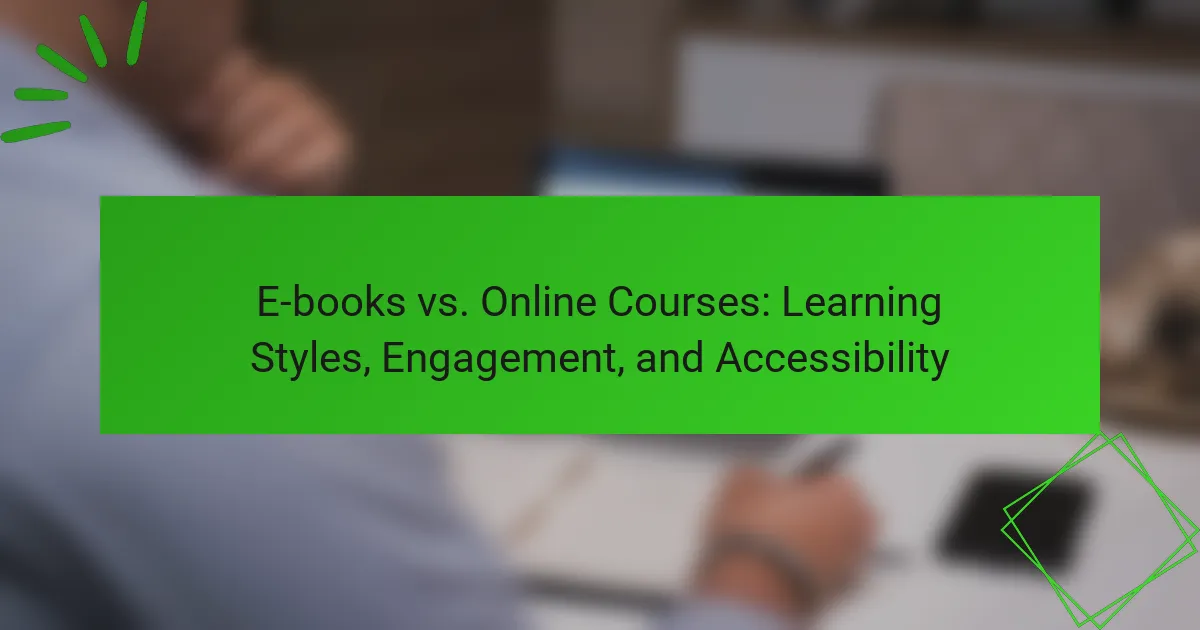The debate between e-books and online courses highlights the importance of individual learning styles and preferences in educational settings. While e-books provide a flexible and convenient way to access information, online courses often enhance engagement through interactive features and multimedia content. Understanding these differences can help learners choose the most effective method for their personal and educational goals.
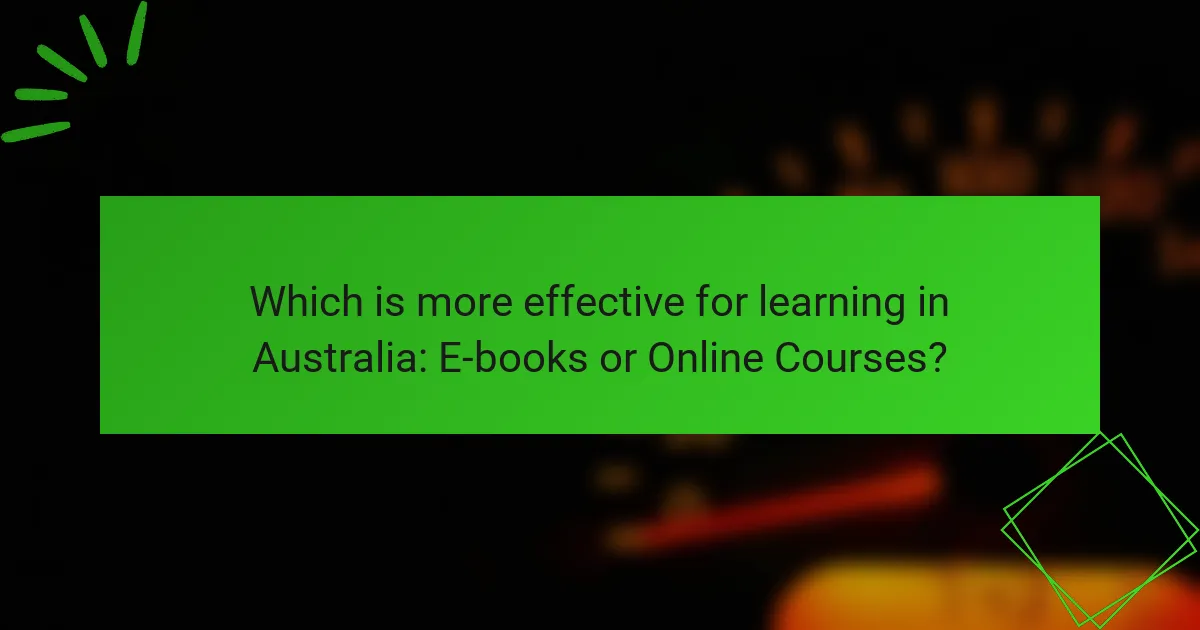
Which is more effective for learning in Australia: E-books or Online Courses?
In Australia, the effectiveness of e-books versus online courses largely depends on individual learning preferences and goals. E-books offer flexibility and convenience, while online courses provide interactive elements that can enhance engagement and retention.
E-books provide flexibility for self-paced learning
E-books allow learners to study at their own pace, making them ideal for those with busy schedules or varying learning speeds. This format enables users to revisit complex topics as needed, facilitating deeper understanding.
For example, someone juggling work and family commitments can read an e-book during short breaks or at night, fitting their learning around their lifestyle. This self-directed approach can be particularly beneficial for learners who prefer to control their study environment and timeline.
Online courses offer interactive engagement and feedback
Online courses typically include interactive components such as quizzes, discussion forums, and live sessions, which can significantly enhance the learning experience. These features foster a sense of community and provide immediate feedback, helping learners stay motivated and engaged.
For instance, a course on digital marketing might include assignments where participants create campaigns and receive critiques from instructors and peers. This hands-on approach can lead to better retention of information compared to passive reading of e-books.
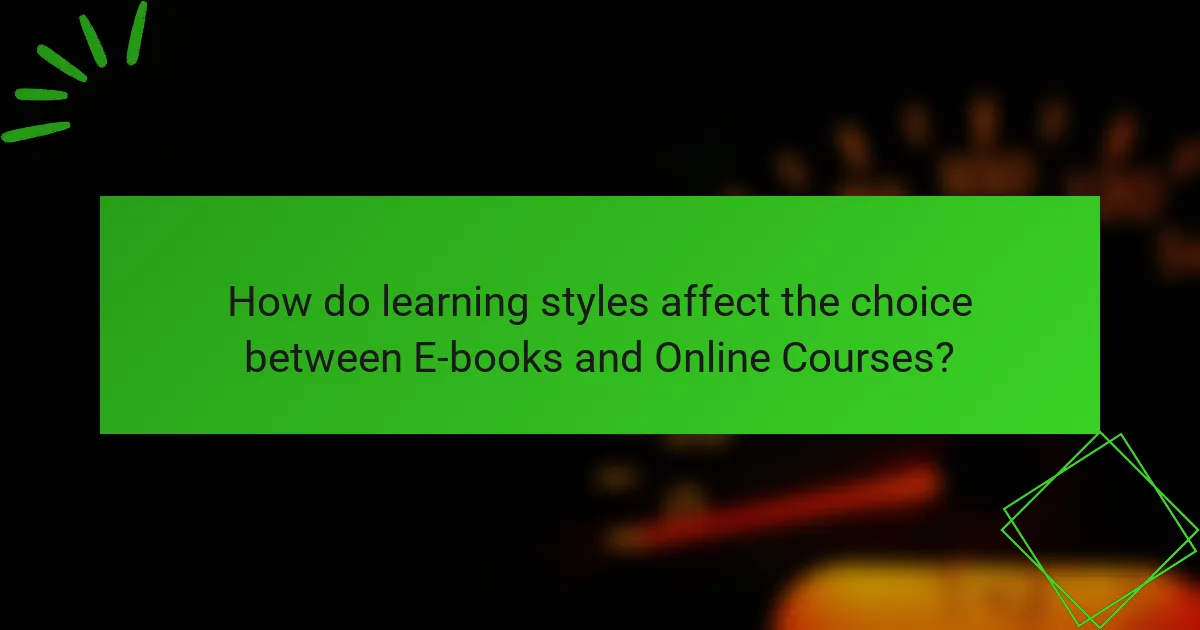
How do learning styles affect the choice between E-books and Online Courses?
Learning styles significantly influence whether individuals prefer E-books or online courses for their educational needs. Visual learners often thrive with interactive online courses, while auditory learners may find E-books more suitable for reading aloud and processing information.
Visual learners benefit more from online courses
Visual learners typically grasp information better through images, videos, and interactive content. Online courses often incorporate these elements, making them more engaging and effective for this group. For instance, a course that includes infographics, charts, and video demonstrations can enhance understanding and retention.
Additionally, online courses frequently offer quizzes and interactive exercises that provide immediate feedback, which can further aid visual learners in assessing their comprehension. This interactive approach can lead to a more immersive learning experience compared to traditional E-books.
Auditory learners may prefer E-books for reading aloud
Auditory learners often excel when they can hear information, making E-books a viable option if they read aloud or use text-to-speech features. This method allows them to absorb content through listening, which can enhance their understanding and retention of material. E-books that include audio narration can be particularly beneficial for these learners.
Moreover, auditory learners might find it easier to engage with E-books during commutes or while multitasking, as they can listen to the content without needing to focus on a screen. This flexibility can make E-books a practical choice for those who prefer auditory learning methods.
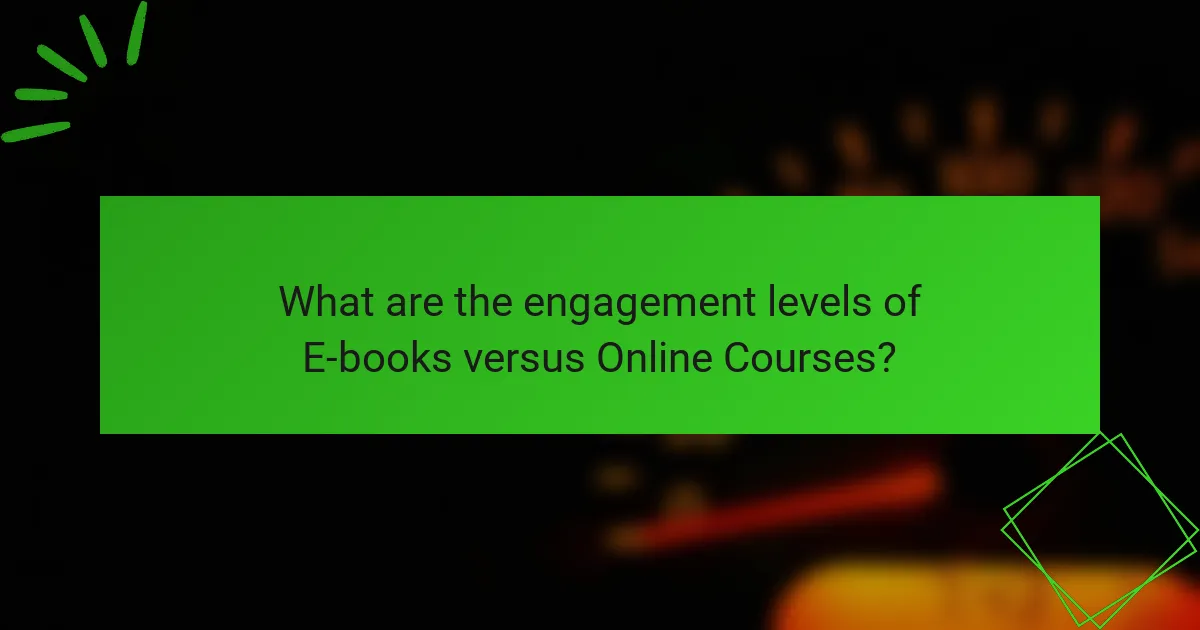
What are the engagement levels of E-books versus Online Courses?
Online courses typically offer higher engagement levels compared to e-books due to their interactive elements and multimedia features. E-books, while valuable for focused reading, may not capture attention as effectively as the dynamic content found in online courses.
Online courses have higher engagement through multimedia
Online courses utilize various multimedia formats such as videos, quizzes, and interactive simulations, which can significantly enhance learner engagement. These elements cater to different learning styles, making the material more accessible and enjoyable for a broader audience.
For instance, a course on digital marketing may include video tutorials, infographics, and interactive case studies, allowing learners to engage with the content in multiple ways. This variety can lead to better retention and understanding of complex topics.
E-books allow for deeper focus without distractions
E-books provide a distraction-free environment that can promote deeper focus and comprehension. Readers can immerse themselves in the material without the interruptions often found in online courses, such as notifications or the temptation to multitask.
For example, when studying a technical subject like programming, an e-book allows learners to concentrate on the text and illustrations at their own pace, which can be beneficial for grasping intricate concepts. However, it’s essential to create a conducive reading environment to maximize this benefit.
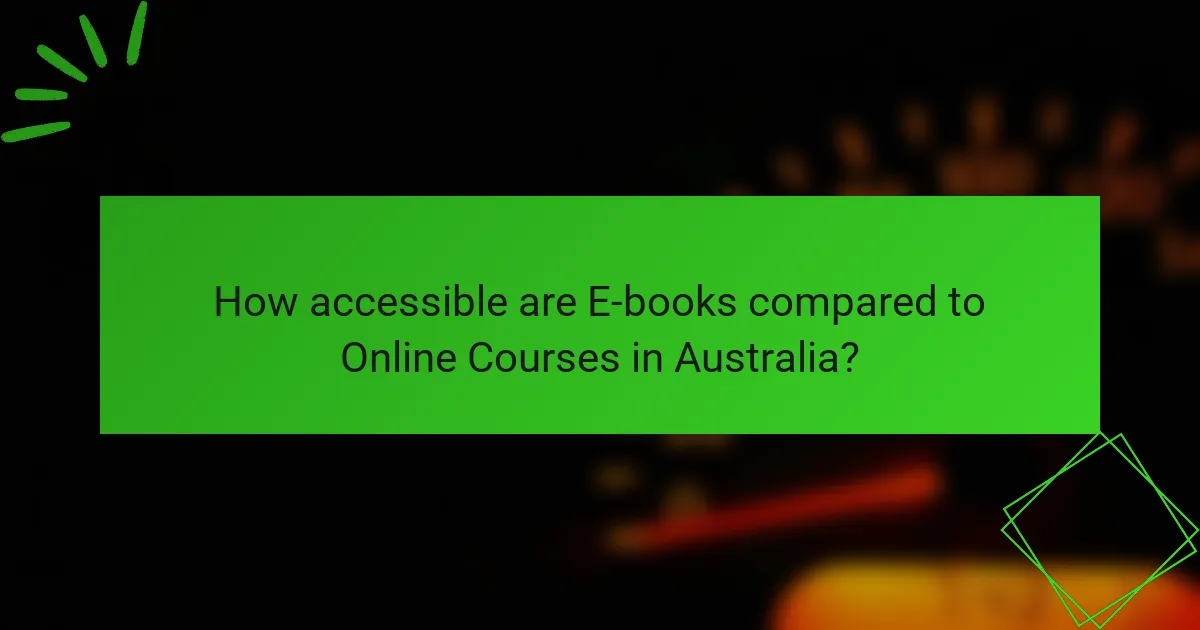
How accessible are E-books compared to Online Courses in Australia?
E-books are generally more accessible than online courses in Australia due to their easy downloadability and portability. Users can access e-books on various devices without needing a constant internet connection, while online courses often require stable internet access for streaming content.
E-books are easily downloadable and portable
E-books can be downloaded onto multiple devices such as tablets, e-readers, and smartphones, allowing learners to access materials anytime and anywhere. This portability means that users can read during commutes or in locations without internet access.
Additionally, e-books typically require minimal storage space, making them convenient for users with limited device capacity. Many e-books are available in formats that support various reading apps, enhancing accessibility for diverse learning preferences.
Online courses require stable internet access
Online courses often necessitate a reliable internet connection for streaming videos, participating in live sessions, and accessing interactive content. This requirement can limit accessibility for individuals in rural or underserved areas of Australia where internet connectivity may be inconsistent.
Furthermore, some online courses may have specific technical requirements, such as certain browsers or software, which can pose additional barriers. Users should ensure they have the necessary setup before enrolling in an online course to avoid interruptions in their learning experience.
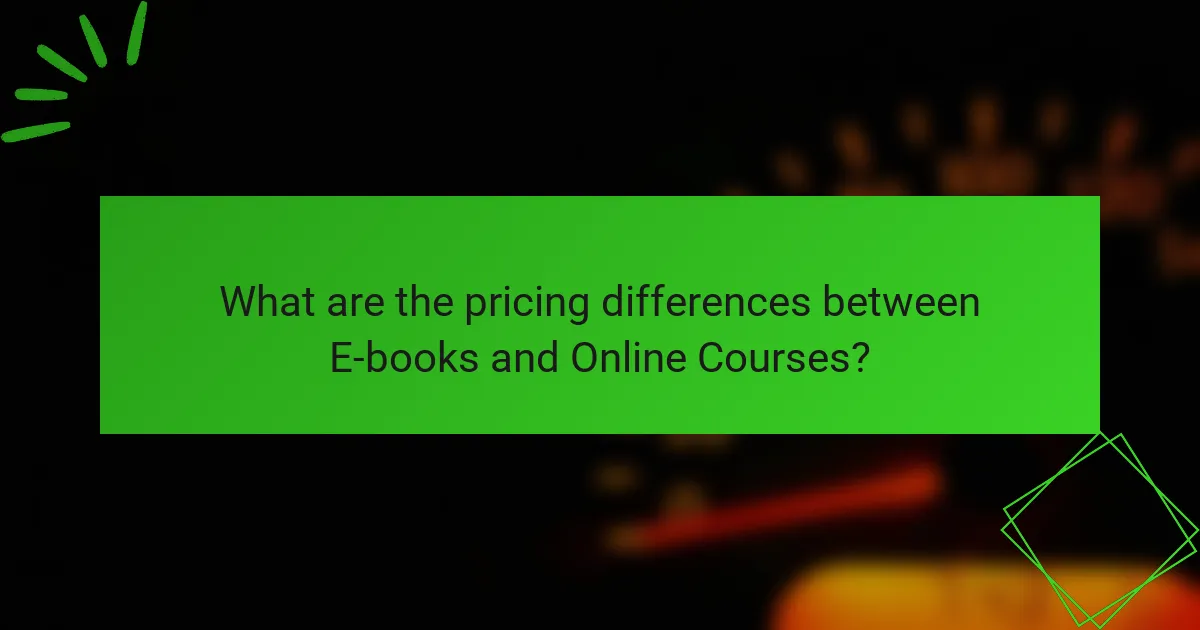
What are the pricing differences between E-books and Online Courses?
E-books typically cost less than online courses, making them a more budget-friendly option for learners. However, online courses may provide greater value through their extensive content and interactive features.
E-books are generally more affordable
The price of e-books usually ranges from a few dollars to around fifty dollars, depending on the subject matter and author. This lower cost makes e-books accessible to a wider audience, especially those on a tight budget.
Many e-books are available for free or at discounted rates through libraries or promotional offers, further enhancing their affordability. This makes them an attractive option for learners seeking basic knowledge without a significant financial commitment.
Online courses may offer more value through comprehensive content
Online courses often range from around twenty dollars to several hundred dollars, reflecting their more in-depth content and interactive elements. These courses frequently include video lectures, quizzes, and community forums, which can enhance the learning experience.
While the upfront cost is higher, the comprehensive nature of online courses can lead to better retention and understanding of the material. For those looking to gain practical skills or certifications, investing in an online course may provide a greater return on investment compared to purchasing multiple e-books.
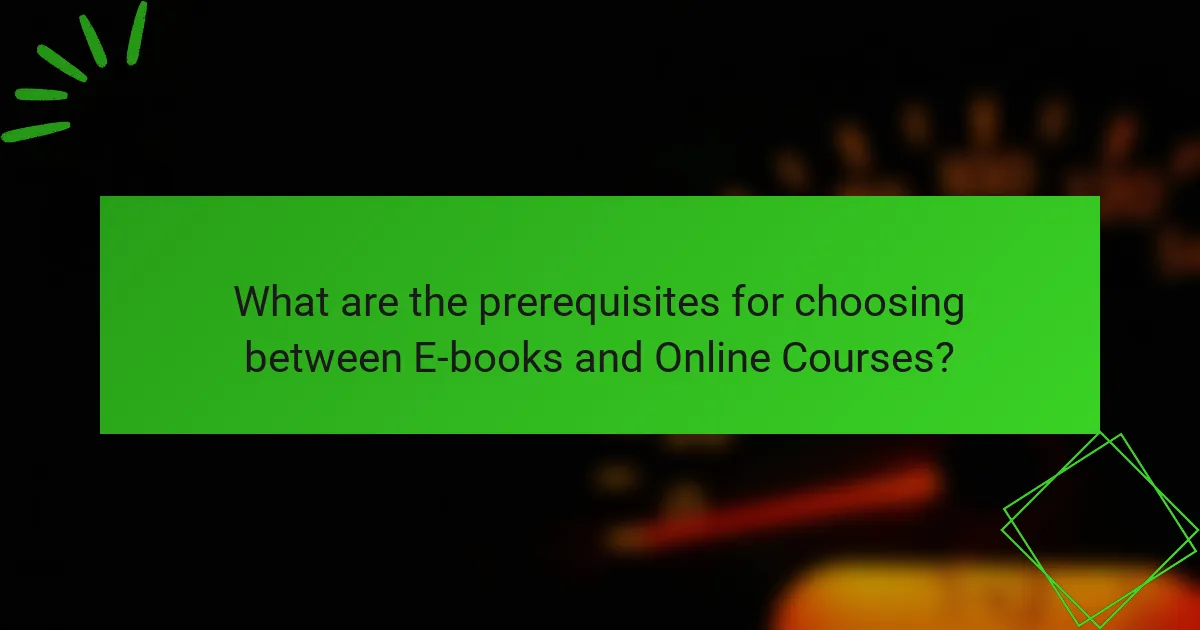
What are the prerequisites for choosing between E-books and Online Courses?
Choosing between e-books and online courses depends on your specific learning needs, preferences, and circumstances. Understanding your goals, budget, and time commitment will help you make an informed decision that aligns with your educational objectives.
Identify your learning goals and preferences
Start by clarifying what you want to achieve. If you prefer structured learning with interactive elements, online courses may be more suitable. Conversely, if you enjoy self-paced reading and prefer to learn through text, e-books might be the better option.
Consider your preferred learning style. Visual learners may benefit from video content in online courses, while auditory learners might find podcasts or narrated e-books more engaging. Reflect on past experiences to identify which format has worked best for you.
Assess your budget and time commitment
Your budget plays a crucial role in this decision. Online courses can range from free to several hundred USD, depending on the provider and course depth. E-books are generally more affordable, often costing between 5-30 USD, making them a budget-friendly option for many learners.
Time commitment is another important factor. Online courses often require a set schedule and may take several weeks to complete, while e-books allow for flexible reading at your own pace. Evaluate how much time you can realistically dedicate to learning before making your choice.
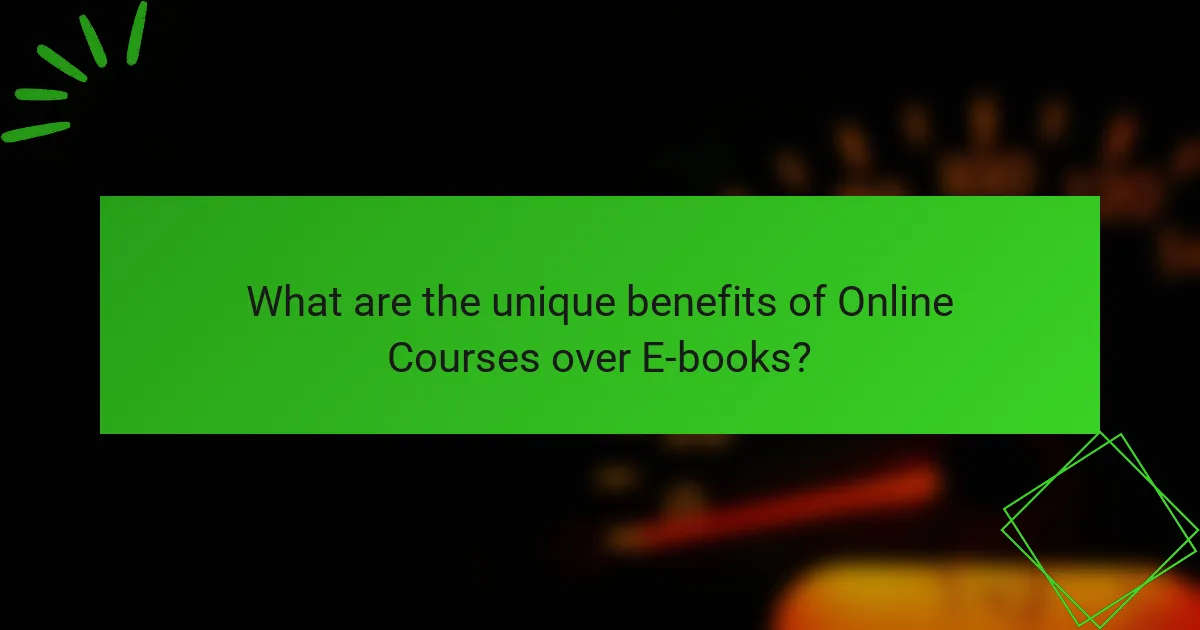
What are the unique benefits of Online Courses over E-books?
Online courses offer interactive learning experiences that e-books cannot match, such as real-time feedback and community engagement. These features can significantly enhance understanding and retention of material.
Live interaction with instructors enhances learning
Online courses often include live sessions where students can interact directly with instructors. This immediate access allows learners to ask questions, clarify doubts, and receive personalized feedback, which can deepen understanding of complex topics.
For example, a student struggling with a specific concept in a programming course can ask the instructor for help during a live Q&A session, leading to a quicker resolution than reading an e-book alone. This dynamic interaction fosters a more engaging learning environment.
Structured timelines help maintain motivation
Online courses typically have set schedules and deadlines, which can help keep learners accountable and motivated. Unlike e-books, which allow for self-paced learning, the structure of a course encourages students to stay on track and complete assignments on time.
For instance, a course might require weekly submissions, prompting students to manage their time effectively. This can be particularly beneficial for those who struggle with self-discipline, as the course framework provides a clear path to follow.






